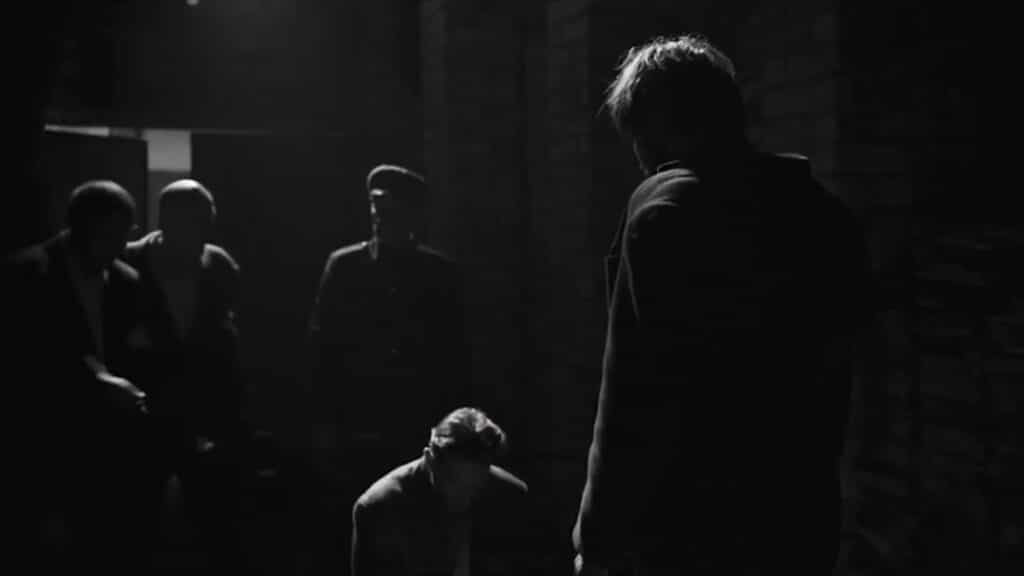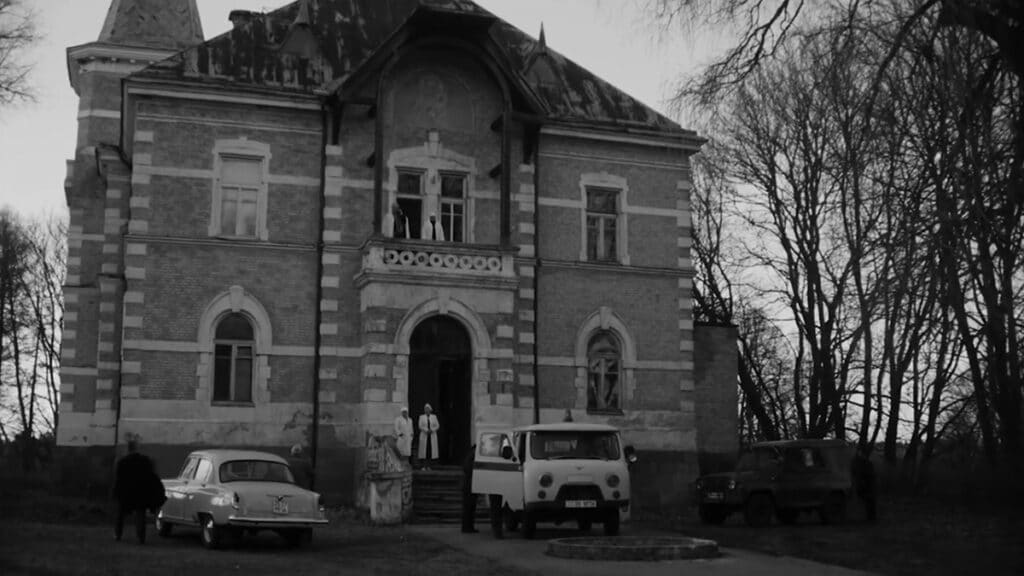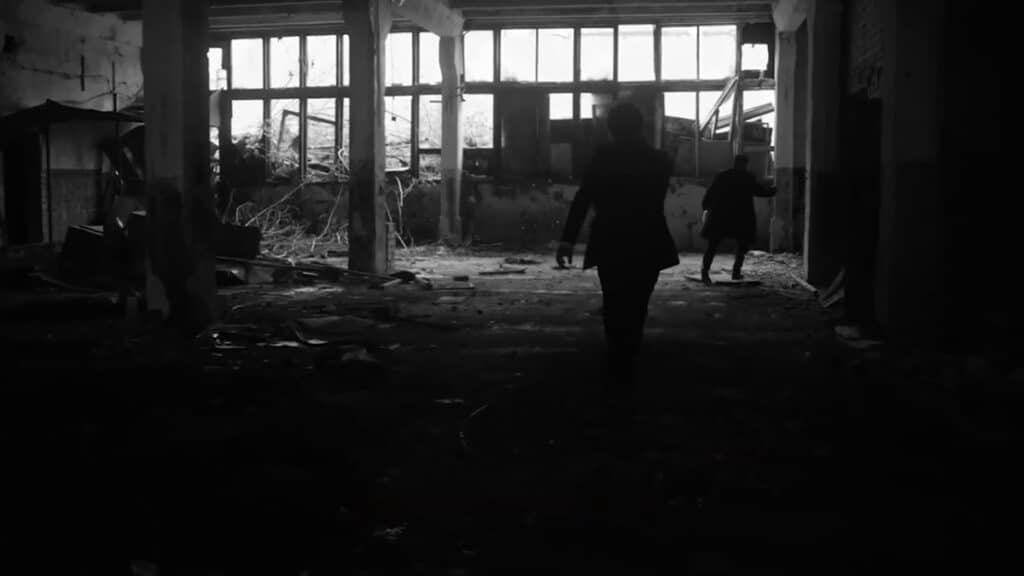Slamdance 2021 Review: Isaac
Isaac (Izaokas) (2019) is a Lithuanian drama. The screenplay was written by Jurgis Matulevicius, Saule Bliuvaite, and Nerijus Milerius, based on a short story by Antanas Skema. It was directed by Jurgis Matulevicius.
The film begins in 1941 in Lithuania. World War II is in full swing. Hitler’s antisemitic propaganda has been effective in Lithuania, in addition to other European countries. Violence has erupted in the Kaunas town square. Jews are being dragged through the streets, beaten, tortured, and murdered. A man names Andrius (Alexsas Kazanavicius) wanders through the fracas, when suddenly he is accused of being Jewish by one of the pro-Nazi thugs that is orchestrating much of the violence.
Andrius manages to convince the man that he is not Jewish. However, the man forces Andrius around the corner and into a barn, where he is directed to kill a Jewish man who is being held captive in the barn. Andrius picks up a shovel, and bashes the Jewish man’s head in, killing him, but saving his own life in the process.

Fast forward to the 1960s’. Celebrated Lithuanian artist Gediminas Gutauskas (Danius Gavenonis) returns to his homeland following a twenty year stint in the United States. On his way to a meeting, he is reunited with Elena (Sverija Janusauskaite), a former flame. The two instantly warm back up to one another.
Gediminas tells Elena he has returned to Lithuania to shoot a film about the massacre at the garage in Kaunas. Elena implores Gediminas to make her his assistant. It turns out, Elena is in a relationship with Andrius, and has become unhappy and disillusioned. She is desperate to get away, and becoming assistant to Gediminas would likely be her ticket out. Gediminas agrees, and the two begin work together as well as rekindling their romance. Andrius, who is plagued by guilt over his earlier deed, is not happy with Elena’s decision.
As production begins on the film, Gediminas is unaware that he is being monitored by Russian police. They concerned with the politically charged film he is making. Young detective Kazimieras (Martynas Nedzinskas) is also interested in Gediminas for a different reason. Kazimieras is investigating the incident at Kaunas. Between Gediminas departure for the States, combined with the accuracy of the details in his script, Kazimieras believes Gediminas to have participated in the violence at Kaunas, and to be be guilty of murder.
Isaac is the feature film debut of director Jurgis Matulevicius, who has done an admirable job of bringing this story to life. It helps that the script by himself, Saule Bliuvaite, and Nerijus Milerius is very strong. The film works simultaneously as an examination of film and artists, a parable about violence, and the way propaganda can fuel it, a history lesson, and a detective story.
That might sound on the outside like trying to stuff ten pounds of celluloid into a one-pound film canister. However, the script expertly weaves all of these elements into the narrative in a seamless fashion. The one issue I had with the story is that I am to stupid to have followed it as astutely as the film asks its audience to follow it.
There is a phenomenon I have noticed when consuming film in a different language with subtitles. With few exceptions I have found that if I miss a line or two of dialogue, I end up missing some crucial detail, and have to ask dumb questions later on in the film. If anything this is a testament to the high quality of a lot of the foreign films we get here in the U.S. They demand rapt attention be paid to them, lest the viewer find themselves in the proverbial weeds.

The upshot is that when these films are paid the correct amount of attention, they usually have very rich stories that are very rewarding emotionally and intellectually. Isaac was dense enough (the good kind of dense) that I found myself needing to jump back occasionally to reaffirm some detail that I had become uncertain of. I suppose the point is that Isaac may require more than one viewing to fully appreciate and understand the full breadth of the story. Fortunately, the film is successful enough that a rewatch is more of a joy than a chore.
The script is well served by fantastic performances all around. Danius Gavenonis plays Gediminas as a man possessed. He is running at full speed, both toward his artistic goals and away from his past. Gavenonis excellently portrays Gediminas’ mania and drive. Sverija Janusauskaite’s Elena is passionate, yet detached. She has a coolly calculating exterior, but under the surface, the fire burns brightly. As partners in crime, Elena and Gediminas are totally different, yet provide each other with a necessary balance. At least at first. Gavenonis might be the protagonist, but Janusauskaite very well might steal the show. It is impossible to take one’s eyes off her.
The film is also beautifully shot. Most of the scenes are in black and white, with a few in color. Cinematographer Narvydas Naujalis uses light and shadow masterfully to imbue the film with a neo-noir aesthetic, which is perfectly suited to both its detective, and historical angles.
Additionally, the film is quite ambitious, including a number of very complex tracking shots. A lot of times when filmmakers use these kind of long takes (oners, as we call them in showbiz) I find it to be slightly ostentatious. So much has been made of some of the most legendary tracking shots in Hollywood history (Touch of Evil (Orson Welles, 1958) anyone?) that when filmmakers use them, they tend to seem a little ostentatious. Perhaps film school has something to do with how I feel about them, but yeah. Tracking shots usually pull me out of the film, as I actively begin looking for a cut.
The use of long tracking shots in Isaac did not have this effect on me however. At first, I was aware of them, but, as any good film will do, the story pulled me in so deep that I quickly forgot to keep looking for a cut. These shots are ambitious for any cinematographer, and especially for a first time director. Both Naujalis and Matulevicius rose admirably to the challenge. The camera work and the shot composition fully serve the narrative, and are both beautiful.

The main drawbacks to the film are the density of the story, and the heaviness of the subject material. I can see many people (myself included) feeling as if they have missed information, or that they should have more information prior to watching the film. Although I can’t really fault the film for this, I can see it being an obstacle for some viewers.
Additionally, the film is very violent. This too is not a criticism, for there is much violence at the core of the story, depicting it is vital to the success of the film. However, for viewers who are put off by this kind of thing, they might have a hard time getting through Isaac. However, if someone found themselves squeamish at the violence I would try to get them to push through it, for the story is ultimately so rewarding.
I almost forgot to mention that the film is very stylish as well. It doesn’t get too weird, nor does it prize style over substance, however, there are some moments that are wonderfully stylish. The soundtrack is excellent as well.
Isaac is a noteworthy film from a talented crew. If I didn’t know any better, I never would have guessed that this was a first feature. It has been crafted by some apparently very skilled hands. It is a provocative and unflinching look at a lesser-known, but nevertheless, important historical event, and the way its ripples echo through time. The acting, direction, and cinematography are all excellent. Hopefully this thing gets picked up for distribution. I have a feeling that Matulevicius and crew likely have some awards, or at least nominations in their future. If they aren’t for this film, Isaac may pave the way for them down the road.
Review
Rating
RN Review of Isaac
Isaac is a noteworthy film from a talented crew. If I didn't know any better, I never would have guessed that this was a first feature.



